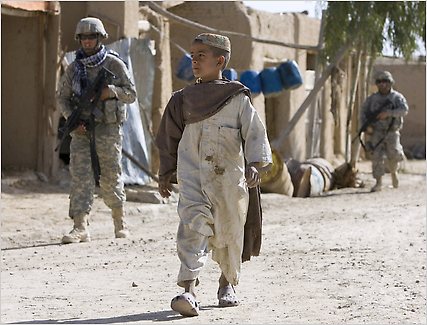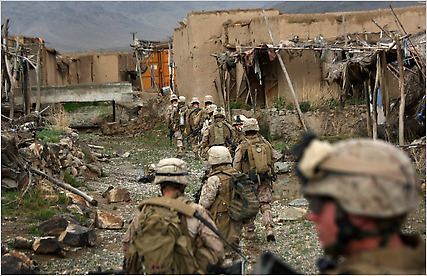 Home Fires features the writing of men and women who have returned from wartime service in the United States military.
Home Fires features the writing of men and women who have returned from wartime service in the United States military.Tags:
 Reuters An Afghan boy walked near American soldiers patrolling in Now Zad in southern Afghanistan on March 7. Afghans have been returning to the town after it was secured by a Marine-led operation in December.
Reuters An Afghan boy walked near American soldiers patrolling in Now Zad in southern Afghanistan on March 7. Afghans have been returning to the town after it was secured by a Marine-led operation in December. Last week Defense Secretary Robert Gates visited the district of Now Zad in Afghanistan’s volatile Helmand Province. To many, it probably didn’t seem like significant news. Gates reportedly went no farther than a 100 meters outside the forward operating base and there were fully armed Marines posted at short intervals not far from where he was walking. They had probably been in position for at least 24 hours before Gates arrived and the area was likely swept for explosives and insurgents multiple times in the days prior to his arrival.
This surely reeks of political theater to the skeptical, but for those of us who have experienced the brutality of Now Zad’s history first-hand this news brings us one page closer to the end of long chapter in our lives.
Now Zad had become too precious for either side to give up but not valuable enough to warrant the resources to win.
This time last year I was second in command of the approximately 300 Marines fighting it out in this very district. Daytime temperatures were approaching intolerable levels and I could hardly wait for my time there to come to an end. With two and a half months left before I could render my final salute to the place that had taken so much from me, taken so much from us, I was tired. I was becoming ever more frustrated with what we were doing there and became doubtful of our purpose.
Now Zad had been locked in a stalemate since 2006, when British forces attempted to regain control of the district after several years of Taliban rule. Around the time that the U.S. launched the initial invasion in 2001, Now Zad was actually a relatively peaceful place — a thriving district in the Pashtun-dominated south. The United Nations, the European Union, and several N.G.O.s even managed to build a school and a health clinic, and install wells throughout the town. The calm was of the fleeting type, though, and by 2006 the town had become a major Taliban command center and logistics hub.
The devastating fighting between British forces and the Taliban prompted the estimated 30,000 residents to flee. Some moved north, some moved south, and some fled to other parts of the country, but none of them stayed.
Related
Home Fires: Retelling the War
Veterans discuss how books, movies and other tales of combat shaped their outlooks on war.
Neither the British nor the Taliban had enough manpower to drive the other out and the battle for Now Zad deteriorated into deadlock. With no hearts or minds to win, placing troops in Now Zad had been called into question at various points in time. But with blood already spilt, it had become a gem too precious for either side to give up but not valuable enough to warrant the resources to win. It was a precarious equilibrium in which both sides were tremendously fearful of the other gaining any kind of advantage. It was nothing more than a bloody tit-for-tat game in which the enemy and international forces were both continuously winning and losing.
By the time I arrived the stalemate was approaching its third birthday. Little had improved over the years and you still couldn’t move more than 300 meters outside the base without expecting to take contact or stumble upon an I.E.D. As a 26-year-old officer on my first combat tour, I was determined and convinced that we would be the ones to finally break the impasse.
Our commanding officer repeatedly reminded us that we were placeholders, expected to do no more than retain the hard gained territory until more forces could come and take the entire district. For young, aggressive, and well trained Marines, this was a deeply unsatisfying mission and we constantly pushed the boundaries by conducting patrols farther and farther into enemy territory.
 John Moore/Getty Images Marines patrolling through Now Zad in April 2009.
John Moore/Getty Images Marines patrolling through Now Zad in April 2009. It didn’t take long before the enemy pushed back and we started to take casualties. At first it hardened our resolve to fight. But as time went on and the number of those hurt and killed mounted, attitudes began to shift. For some it was a slow transition that took months, for others it only took a single, horrible event. However it came, we all got to the point where we wondered if there was anything we were doing out there that justified these Marines, these men, these boys, dying and getting hurt.
Since I was responsible for planning all daily operations, the mounting casualties began to weigh on me — they still do. After a string of hard missions that resulted in four dead Marines, it just felt like no matter how meticulously we planned, how precise our patrol movements, or how unwavering we were in the face of the enemy, we were just destined to get more of our own hurt. And for what? We were fighting for a war-ravaged town of mud huts in which no Afghans lived. There was no Afghan army or government, just us fighting against a ruthless and uncompromising enemy. It all just seemed like some sadist’s game that we had to endure.
Every casualty left me more and more dejected. I knew the mission but, with little to show for our efforts, I doubted its usefulness. We tried so damn hard to improve the situation in Now Zad but it all just seemed futile. It became incomprehensible how anything positive could ever come of the place, and that is how it remained, until last week.
Initially lured by the promise of a modest wage, men and boys started to return to Now Zad only a couple of weeks ago. The Marines paid them to clean up debris and ruined buildings in the hopes of making Now Zad habitable again one day. Entrepreneurial Afghans soon recognized the new economic opportunities that came with the Afghan National Army and opened up a few shops. The Marines, with the help of their Afghan interpreters, opened up two schools, one for boys and one for girls.
The repopulation effort happened much more quickly than anyone expected and there are now 2,500 Afghans who, once again, call Now Zad home. Entire families have moved back into that very same town of mud huts ravaged by time and war. Life is constricted to the security bubble that the Marines are able to provide and it is by no means normal or ideal. But all this has occurred in a place plagued by conflict, a place that has not been home to Afghans in four years. It is still political theater to some.
The 2,500 Afghans who returned is a paltry sum compared to the 30,000 who once thrived there, but value in war is a relative concept. With a tense security situation and against the backdrop of very real threats, the Afghan people have demonstrated their indomitability by moving back into Now Zad. They have broadcasted their resilience and determination in the face of extreme hardship, the likes of which no people should have to know. Now Zad is a ghost town no more, and in no small way this is an Afghan victory in a fight that has lasted so long. And, in no insignificant way, this is my victory too.

Michael Buonocore spent four years as an infantry officer in the Marine Corps. He returned in June 2009 from a seven-month tour in Helmand Province, Afghanistan, where he was the executive officer of Lima Company, 3rd Battalion, 8th Marine Regiment. He is currently a graduate student at Harvard University’s John F. Kennedy School of Government.











